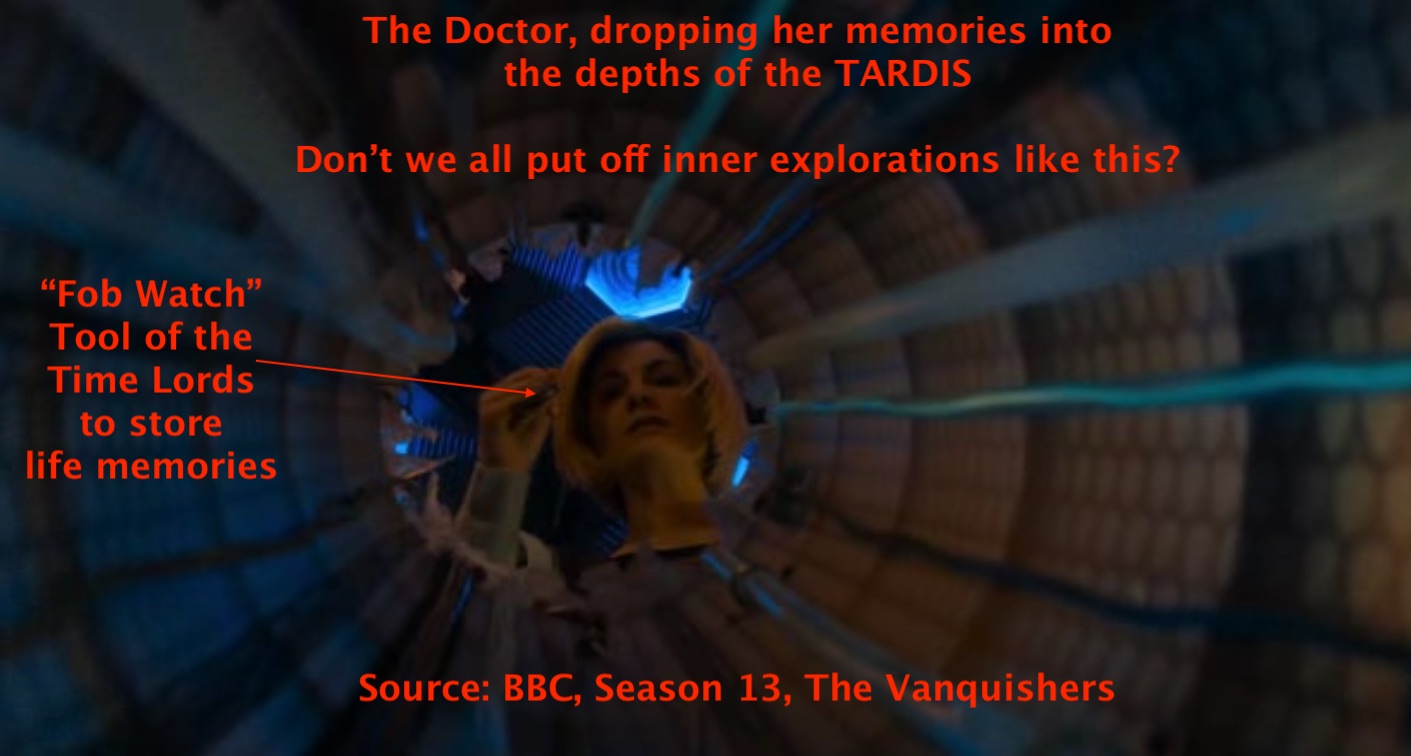; Date: Wed Dec 08 2021
Tags: Doctor Who »»»» Doctor Who Season 13 »»»»
During Season 12, we were told that The Doctor is The Timeless Child, a previously unknown being from whom The Time Lords developed Regeneration and perhaps other knowledge. During Season 13, the whole season was about conflicts left over from those hidden memories. The season ended with The Doctor receiving a "Fob Watch" containing the whole story, and then The Doctor deciding to not open the watch but leave it for another day.

As symbolic allegory, this Fob Watch thing of the Time Lords represents how we all separate off part of our life memories, forgetting about things, our dreams and hopes from former years, to instead live our current life. It's perhaps easier to avoid rummaging through the past because we're too busy with jobs and mortgage payments to have the time for that. Plus, our past might be full of pain, that we caused others, or others caused to us, and that might have given us plenty of reasons to forget the past.
But, such past memories represent a loss to us, a part of us that is lost making us less capable to handle the present. In other words there is a lot of possible gain from recovering our past memories, hopes, dreams, etc. Who we are now is the sum of all our previous life, but walling off part of our past means we aren't living ourselves fully.
At least that's one theory about this. There are other views, of course, one of which is what we saw The Doctor do at the end of The Vanquishers.
Why did The Doctor dump the Fob Watch containing her full life memories into the depths of the TARDIS? Didn't she spend many episodes desperately searching for clues about this? And now that she has the answers, why not just open the dang watch and find out?
Why did Chris Chibnall put us all through these stories about The Timeless Child, the destruction of the Universe, that The Division chose to destroy the Universe because it contained The Doctor, etc, but then not follow through?
The Doctor's past and present
First, there is a big issue from all of Doctor Who. Who is The Doctor? What race is The Doctor? Is The Doctor a human, or from another world?
That last question may be surprising given that we all know The Doctor is a Time Lord from Gallifrey. But, during the time of the 1st and 2nd Doctor episodes, we didn't know about The Time Lords at all. They weren't introduced until the last episode of the 2nd Doctor. Even then, the concept wasn't fleshed out, because bits and pieces were developed over the years.
We consider The First Doctor to have been Willian Hartnell's Doctor. That means, he played the first incarnation of The Doctor. The Doctor's incarnations have been numbered since then as we discussed elsewhere: Smith was 13, Capaldi 14, Whittaker 15, how many regenerations does The Doctor have remaining?
But, was Hartnell's Doctor the first incarnation?
In a Fourth Doctor story, The Brain of Morbius, The Doctor had a mental combat with Morbius, during which several pre-Hartnell incarnations of The Doctor emerged. Ever since that story there's been speculation that perhaps The Hartnell Doctor wasn't the first regeneration.
But there were other episodes in which a 12 regeneration limit was established. Which led to an issue with The Smith Doctor who, according to normative numbering, was to be the last incarnation of The Doctor. Again, see Smith was 13, Capaldi 14, Whittaker 15, how many regenerations does The Doctor have remaining? for details. Through some Time Lord magic, that regeneration limit was lifted opening the door to Peter Capaldi and then Jodi Whittaker as The Doctor.
But, Chris Chibnall seems to have wanted to turn that all on its head.
Pre-Hartnell Doctor's, and a different take on who is The Doctor
During the Seventh Doctor's time, Sylvester McCoy, the show runner was following an agenda of presenting The Doctor as a more significant figure than just someone bumbling around the universe freeing planets from tyranny. Over the course of several episodes, he fought The Gods of Ragnarok, was identified as being Merlin in the midst of a battle with Morgaine, a time traveling demigod witch, and much more. Basically, The Doctor's natural element in those stories was among The Gods.
In one episode, we learned The Doctor had rescued The Hand of Omega from Gallifrey. This was a device, a Stellar Manipulator, developed by Omega, one of the early Time Lords who was critical to developing Time Lord technology. While explaining all this to his companion, Ace, The Doctor slipped and said "didn't we have trouble with the prototype" implying that The Doctor was involved in the research done by Omega and Rassilon from which all of Time Lord technology rests. See: Omega, The Hand of Omega, Rassilon, The Doctor, and the nonsensical story of The Timeless Child
That's another indication that The Doctor had pre-Hartnell incarnations, and that The Doctor remembers some of that period.
For most of Doctor Who, The Doctor has been an individual Time Lord, bumbling around the Universe, fixing up things that have gone wrong, overthrowing dictatorial regimes, and perhaps trying to patch up mistakes s/he have made.
As I see it - The Doctor represents an Everyman who has taken a path of optimism and confidence to take on issues in the world.
But, Chibnall wanted to make The Doctor into something more, it seems.
This Timeless Child concept is a way of saying The Doctor isn't one of the regular Time Lords. Instead, The Doctor was the pattern from which all Time Lords were developed. And, that The Doctor's natural role is having battles with multidimensional beings like The Ravagers who existed before Time was created.
For The Division to have decided to destroy the entire Universe just because of The Doctor, is plainly ridiculous. But, taken at face value, this puts The Doctor into a critical role in the Universe, that The Doctor can determine whether or not the Universe exists? And at the end of The Ravagers, we see The Doctor having a discussion with a personified image of Time, in which Time delivers a Threat to The Doctor? Really....?
Even in the Key to Time season, when The White Guardian sent The Doctor on a quest, even then The Doctor was not given such significance.
Dumping life memories into storage for another day
What Chris Chibnall did was create Canon references to pre-Hartnell Doctor incarnations, and the Timeless Child concept, but not fully explore the idea. Instead, all that were put into storage. Effectively, they'll remain in storage until a future Doctor Who show runner figures out how to deal with them.
That's what Doctor Who show runners have done for the past 60 years. The Time Lords were revealed at the end of the 2nd Doctor's time. But, almost nothing was revealed about them at that time. Instead, those show runners left it to subsequent show runners to pick up the idea and flesh it out. But they, too, only gave a few more tidbits, leaving it for later show runners to do more.
And, to be clear, there simply wasn't time in the episodes of Season 13 to have a full revelation. As pointed out in a previous post, way too much stuff was jammed into Season 13 anyway. There wasn't enough time for anything to breathe. That means a full revelation of The Doctor's past was impossible in the time available.











